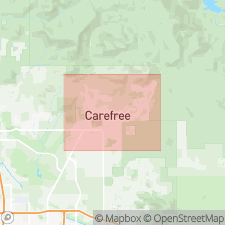
- Usage in publication:
-
- Go John Diorite
- Modifications:
-
- Named
- Dominant lithology:
-
- Diorite
- AAPG geologic province:
-
- Basin-and-Range province
Summary:
Named for Go John Mountain. Type locality at junction of Willow Springs Wash and Cave Creek, Cave Creek quad, northern Maricopa Co., central AZ. Igneous intrusion exposed in bed and along banks of Cave Creek covering area approx 0.30 mi wide and 0.65 mi long in southwestern part of Carefree basin. Isolated pods also present in mountains on western side of Cave Creek (Lewis, 1920). Consists of dark-gray to dark-green, fine-grained, massive, resistant diorite with feldspar crystals up to 0.05 in. long; weathers along parallel sets of joints into blocky fragments; locally contains abundant white quartz veins up to 0.8 in. wide showing minor deformation. Contact alteration zone measures 1.5 to 10.0 feet where the suddenly dark-gray to black Go John Diorite intrudes Precambrian meta-argillite--phyllite complex. Unconformably overlain by Holocene Cave Creek Alluvium (new) and by Pleistocene Mesquite Tank, Cahava Ranch, and Hidden View Terrace deposits (all new, [informal]). Absolute age unknown but Middle Proterozoic inferred by assumed relationship with Middle Proterozoic (1400 Ma) Camelback Granite. Report includes geologic map and cross section, and stratigraphic nomenclature table.
Source: GNU records (USGS DDS-6; Denver GNULEX).
For more information, please contact Nancy Stamm, Geologic Names Committee Secretary.
Asterisk (*) indicates published by U.S. Geological Survey authors.
"No current usage" (†) implies that a name has been abandoned or has fallen into disuse. Former usage and, if known, replacement name given in parentheses ( ).
Slash (/) indicates name conflicts with nomenclatural guidelines (CSN, 1933; ACSN, 1961, 1970; NACSN, 1983, 2005, 2021). May be explained within brackets ([ ]).

